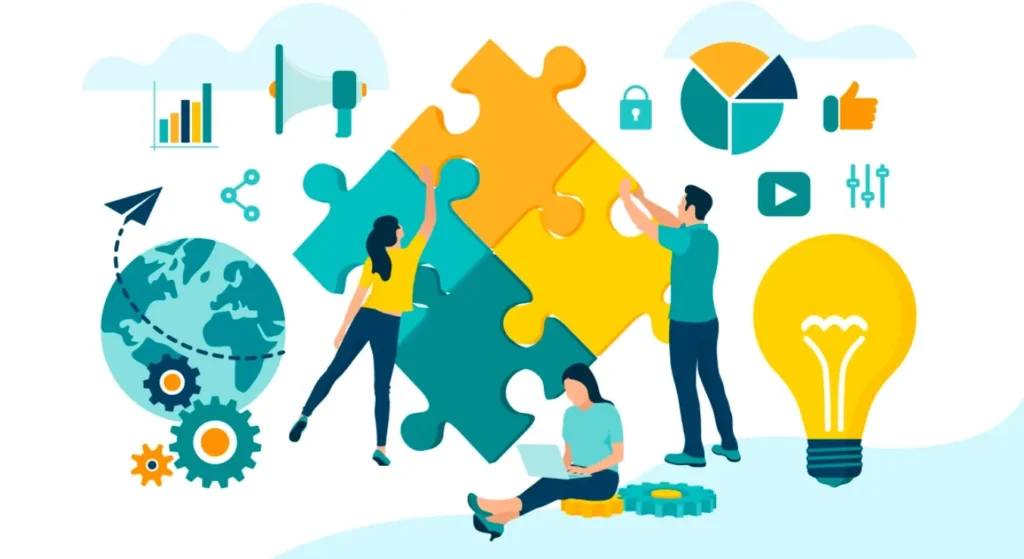Written By – Mrs. Vaishali Rupam Pimpalkar, AS & A Level Chemistry Teacher
Bridging the Gap: The Symbiotic Relationship of Communication and Teamwork
 Communication, at its simplest, is the act of transferring information from one place to another. Being able to communicate effectively is perhaps the most important of all life skills. It may be vocal, written, visual, or non-verbal. In practice, it is often a combination of several of these. Communication skills may take a lifetime to master—if indeed anyone can ever claim to have mastered them. A classroom is a complex communication system where interactions happen in between individuals coming from various backgrounds and various intellect which needs to be clear, in-depth and organic. Learners should know the basic of etiquettes of communications among them as well as with the educators present around them. Clear and precise language, positive body language, eye to eye contact, careful listening, effective feedback are some of the essential tools of effective communication. One must respect and appreciate the viewpoint of the people in conversation.
Communication, at its simplest, is the act of transferring information from one place to another. Being able to communicate effectively is perhaps the most important of all life skills. It may be vocal, written, visual, or non-verbal. In practice, it is often a combination of several of these. Communication skills may take a lifetime to master—if indeed anyone can ever claim to have mastered them. A classroom is a complex communication system where interactions happen in between individuals coming from various backgrounds and various intellect which needs to be clear, in-depth and organic. Learners should know the basic of etiquettes of communications among them as well as with the educators present around them. Clear and precise language, positive body language, eye to eye contact, careful listening, effective feedback are some of the essential tools of effective communication. One must respect and appreciate the viewpoint of the people in conversation.
When it comes to teamwork, it involves a group of individuals collaborating to achieve a specific goal. Beyond just accomplishing tasks, teamwork encompasses the unity and bond shared among team members. A successful team goes beyond mere task completion; it thrives on mutual respect and recognition of individual strengths. When a group values each member’s contribution, cohesive and productive environment is created reaching the heights of success. Teamwork should be collaborative if a team must achieve success in the task given. There is a small difference between teamwork and collaboration. In teamwork each member of the team gives his input to complete the task, but collective efforts contribute to collaboration. Thats why collaborative teamwork acts as the catalyst, propelling success to its zenith in moments. But one must remember that while collaborative teamwork provides the foundation, effective communication is the bridge that leads to success.
Ineffective communication skills are the fundamental problem of any failed teamwork. Teamwork and communication skills are an integral part of a learner’s personal, emotional, societal, and professional growth.
Why Are Teamwork and Communication Not Just Skills, But Classroom Essentials?
Due to the pandemic, the education sector’s dependency on digital infrastructure has increased. But this digital education has come at the cost of the much-needed life skills such as personal and interpersonal skills. Students got isolated from the real world. Diverse lives must converge and collaborate to effectively confront the challenges of our world. Reconnecting those isolated during the pandemic to the broader community presented challenges due to their diminished social and communication skills. Teaching and learning are no more an exception and has been directly affected so as the interaction between teachers and students. Effective communication is essential in all areas, and maintaining a healthy mind and body implies good communication. Teamwork and communication go hand in hand. It helps learners to build meaningful relationships with their peers. These relationships can lead to friendships, networking opportunities, and a support system both academically and personally. While conflicts are unavoidable in teamwork, their resolution plays a pivotal role in shaping team dynamics. Ineffective communication skills are the fundamental problem of any failed teamwork.
Together Towards Tomorrow: Collaborative Approaches in Education
 Teamwork:
Teamwork:
Skill Development: Collaboration helps students to cultivate essential real-world skills such
as leadership, problem-solving, compromise, and time management.
Diverse Perspectives: Working in teams exposes students to diverse viewpoints and ideas.
This diversity fosters creativity, critical thinking, and a broader understanding of different
cultures, backgrounds, and experiences.
Shared Responsibility: Team projects teach students the importance of shared responsibility
and accountability.
Shared Voices: The Power and Significance of Communication in Working
Together
 Expressing Ideas Clearly: Effective communication enables teammates to articulate their thoughts, ideas, and opinions clearly and persuasively, whether in written or verbal form. This skill is crucial for academic success, interpersonal relationships, and future career opportunities.
Expressing Ideas Clearly: Effective communication enables teammates to articulate their thoughts, ideas, and opinions clearly and persuasively, whether in written or verbal form. This skill is crucial for academic success, interpersonal relationships, and future career opportunities.
Active Listening: Communication is not just about speaking; it’s also about listening. Team members learn the importance of active listening, which involves paying attention, understanding others’ perspectives, and providing constructive feedback.
Conflict Resolution: Effective communication skills equip members with the ability to navigate conflicts and disagreements respectfully and productively. They learn to express their feelings and concerns openly while also being receptive to others’ viewpoints.
Building Relationships: Communication plays a pivotal role in building and maintaining positive relationships with peers, teachers, and other stakeholders. Students learn how to engage in meaningful conversations, establish rapport, and collaborate effectively with others.

Off course common challenge, an educator often encounters in facilitating
teamwork is:
- Conflict among team members due to varying levels of expertise, motivation, and commitment.
- Unequal Participation for example in some teams, certain members might dominate discussions and tasks, while others may feel sidelined.
- Students having negative apprehensions regarding delegation of tasks.
- Students hold the perception that teachers have a biased attitude while grading.
- Students might encounter challenges in managing their time, resulting in delays when completing assignments or projects.
- Lack of effective communication skills especially if there are language barriers or communication styles vary.
- Sometimes students end up with the feeling of a lack of coherence, integration, and zeal to achieve a common goal.
- Collaboration and contribution within a team can also be affected by different learning styles.
- Providing teams with essential resources, be it materials, technology, or information, can present difficulties, particularly in settings with limited resources.
- External Factors such as personal issues, cultural differences, or external commitments can also impact the student’s capacity to actively participate in team project.
Can Teamwork Triumph Over Its Toughest Challenges?
Why not? Let’s try the following
- Establish clear guidelines such as roles, responsibilities, and expectations for each team member and preferred methods of communication e.g., email, messaging apps, frequency of updates, and meeting schedules.
- Promote active listening among the learners eg. asking clarifying questions, summarizing key points, respecting other’s perspectives, and avoiding interruptions during discussions.
- 3Create a supportive environment for expressing their ideas, concerns, and feedback.
- Trust and Respect building among the team members to foster a culture of respect, empathy, and inclusivity.
- Utilize Technology that facilitate collaboration, communication, and project management.
- Promote an environment that embraces varied viewpoints, ensuring every team member’s input is appreciated and honoured.
- Organize activities like icebreakers and group projects to help students work better together.
- Establish regular feedback loops to promote self-awareness, accountability, and continuous improvement.
- Monitor teams’ progress, communication effectiveness, and collaboration dynamics regularly.
- Honesty within a team members can improve the team’s chances to achieve their goals and be more productive in the long run.
How to develop a healthy team atmosphere
In summary, teamwork and communication are essential skills for learners to develop as they navigate their academic journey and prepare for future endeavours. These skills promote collaboration, critical thinking, empathy, and interpersonal growth, laying a solid foundation for success in school and beyond. Collaboration, teamwork, and positive communication are ongoing processes that require contribution and commitment from all team members. By cultivating a culture of collaboration, exploring individual talents, and encouraging clear communication, teams can attain outstanding success while enhancing a harmonious workspace. Interactive dialogue enhances analytical thinking, improves problem-solving capabilities, and gain a deeper understanding of the subject. Taking collective responsibility than blaming a teammate is absolutely necessary. Chalking correct strategies, assigning the correct role to each member, time bound work management, transparent clear communication, active listening, raising questions, effective feedback are some of the important steps in collaborative teamwork to achieve the unachievable.
Bibliography:
Delia Mustea* (2016) The Role of Communication Skills in Teaching Process ERD 2016: Education, Reflection, Development, Fourth Edition
Dr. Kanna Muthiah( 2012) JARS/ Vol. I/ Issue II/Sept-Nov, 2012/226
Hills, H. (2001). Team-Based Learning. Burlington, VT: Gower.
Lewis, M. M. (1952). Communication and Education (Vol. I). British Journal of Educational
Studies
Monika Srivastava https://www.scribd.com/doc/62753783/effective-communication-skills- need-importance-for-teachers
Pramuja Baydillah (10411910000054) Ratna Rintaningrum S.S., M.ED., Ph.D (2012)
https: // ww w.rese archgate.net/ publication/3 54 96 81 94 _Impo rtance_Of_Co mmunication_In_Education
Tomayess Issa(2012) ISBN: 978-989-8533-12-8 © 2012 IADIS
Yahya Don , Arumugam Raman(2019) school management and leadership: teamwork in schools, Vol. I Issue. II 2019 Multidisciplinary Journal of Instruction (MDJI)
https://aboutleaders.com/10-essential-rules-of-teamwork/
https://asana.com/resources/teamwork-in-the-workplace https://baec.aua.am/files/2017/09/Angela_Diloyan_The-Importance-of-Communication-in-
the-Classroom_Capstone.pdf
https://deakinco.com/resource/key-elements-of-effective- teamwork/#:~:text=Communicate%20openly%20and%20transparently&text=It%20involves
%20consistently%20updating%20each,an%20essential%20trust%2Dbuilding%20method. https://www.highspeedtraining.co.uk/hub/communication-skills-for-teacher
https://ischoolconnect.com/blog/importance-of-communication-skills-insider-tips-to- improve/
https://www.linkedin.com/pulse/importance-teamwork-schools-anoop-singh-bishnoi/
https://www.marlborough.org/news/~board/stem/post/four-benefits-of-teamwork-for-student- development-success
https://ncert.nic.in/vocational/pdf/kees101.pdf
https://tokyo.globalindianschool.org/blog-details/importance-of-communication-skills-for- students
https://uwaterloo.ca/centre-for-teaching-excellence/catalogs/tip-sheets/teamwork-skills- being-effective-group-member
I am a dedicated educator committed to igniting the flames of curiosity and fostering a love for learning in every student. I am certified in teaching Chemistry to the age group 14 -18, IGCSE, AS & A Level. With a passion for education and a wealth of experience, I wish to bring enthusiasm, expertise, and empathy to the classroom. I am a steam educator, trying to cultivate a passion for learning while preparing students for the challenges of the 21st century.








































